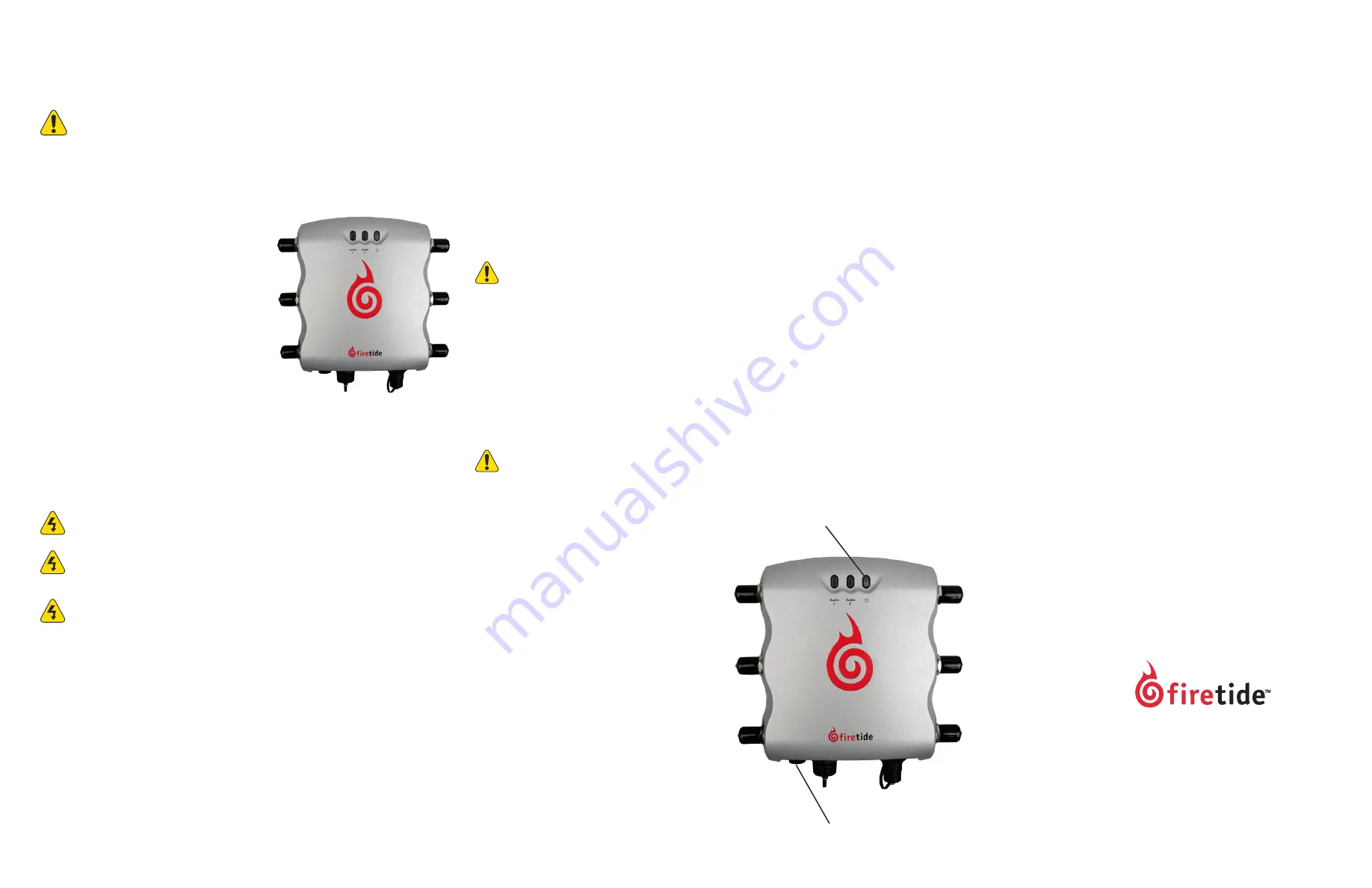
Firetide, Inc.
2105 South Bascom Avenue, Suite 220
Campbell, CA 95008
www.firetide.com
January
201
6
P/N 700-0090-001 Rev
C
©
201
6
Firetide, Inc. All
rights reserved.
Setting the country code
The system periodically prompts you until the country code is set. When the country
code is set, the node operates at full radio strength and the channels are appropriate
for the country of operation.
Caution!
Make sure you configure the node for the correct country of
operation.
1. When the system prompts you to set the country code, select
Set Country Code
Now
.
2. Select the country of operation from the drop-down list.
3. Click
Apply
.
Configuring the radios
Each mesh node has two radios.
1. Go to
Configuration > Wireless
2. Set the Mesh ID and ESSID.
3. Set the wireless mode and channel for
Radio 1 and Radio 2.
4. Set the wireless and end to end security
if needed.
5. Click
Apply
.
7
Do indoor testing.
Send data from the administrator computer connected to one mesh node to another
computer connected to another mesh node. After you finish the tests, remove the
staging antennas and Ethernet cable and disconnect from power.
8
Prepare the node for outdoor installation.
Warning!
Use appropriately rated antennas for outdoor applications.
Warning!
Failure to comply with these installation instructions might result in
severe personal injury including electrical shock or permanent damage to
equipment.
Warning!
Make sure that all safety equipment is in good condition. Do not use
broken or damaged tools or equipment. Always use safe work practices and
obey all local and national guidance for earth ground requirements and
electricity.
Note:
Collect all tools before you install the node.
1. Attach antennas rated for outdoor use.
2. Attach 50 Ohm terminators to unused antenna connectors.
3. To a pole that you can install at a permanent outdoor site, attach these items:
• C-bracket
• Antennas
4. Attach the node to the bracket.
5. (Optional) Attach a PoE injector.
Note:
The PoE+ injector is not weatherproof. Do not expose it to rain or direct
sunlight.
9
Check the outdoor environment for safety.
Do not install this product on a windy or rainy day.
10
Install the mesh node in its permanent location.
Note:
Refer to the
Firetide Best Practices Guide
for detailed instructions.
1. Use the correct safety equipment to install the node in its permanent
outdoor location:
• Install a lightning suppressor.
• Use shielded Cat5e cable and connect to earth ground at both ends.
• Install all grounding equipment.
• Make all cable connections weatherproof.
2. (Optional) Attach the PoE+ assembly to power the device.
Caution!
Do not use port 2 or port 3 of a HotPort 7020 mesh node to power a
HotPort 5020 mesh node. A HotPort 5020 mesh node needs PoE+ or 802.3at,
and the ports of a HotPort 7020 mesh node are PoE 802.3af-compliant only.
3. (Optional) Use plastic tie wraps to keep the cables tidy.
4. Supply power to the node.
5. Ping the IP address of the node to make sure it works.
Resetting the node to the factory default settings
Do a reset when you remove a device from the field or when communication with a
device is lost. The reset button is behind the pressure relief valve on the left side of
the port connector.
Caution!
When a HotPort 5020-M mesh node is reset, configuration
information is erased. The system does not erase the USA (840) country code.
For this procedure you need:
• Paper clip, stiff wire, or thin piece of plastic or wood
• Computer with HotView Pro
• Ethernet cable
• #2 Phillips screwdriver
To reset a HotPort 5020-M mesh node:
1. Supply power to the node.
Wait until the power LED comes on. After
one minute, the node is ready to be reset.
2. Remove the pressure relief valve, and
put it in a safe place.
3. Press and hold for 20 seconds the reset
button with the paper clip or other tool.
The Radio 1 LED blinks to indicate that the
software is rebooting, and you can stop
pressing the reset button.
4. Wait one minute, and then log in with
HotView Pro.
5. Configure the node or apply a previously
saved configuration file.
6. Replace the pressure relief valve that
covers the reset button.
Upgrading the firmware
By default, the system uses the configuration in cache for multiple upgrades.
Best practice:
Upgrade the image two times because you want the backup image and
primary images to be the same.
By default, the scheduler activates the firmware immediately.
If you select the Activate Later check box, the scheduler copies the firmware image to
the node but does not activate the firmware.
1. Go to
Network > Upgrade Firmware
The upgrade scheduler appears.
2. Click
New Scheduler
.
3. Select
Upgrade
.
4. (Optional) Select the time: Later. Use the calendar to a future date and time.
5. Click the tab to select a device type (HotPort Nodes for a mesh network), and then
select the mesh by ID or name.
Note:
The system selects all nodes within a mesh for simultaneous upgrade because all
of the nodes have to run the same firmware. If a node should not receive the upgrade
image, you can remove the mark from the upgrade check box.
6. (Optional) Select
Activate Later
.
7. Select the upgrade image.
8. Click
OK
.
The “upgrade complete” message means that the image file is on the node and is
valid. You can then activate a few nodes at a time until all of the nodes are running
the same firmware version. After the system activates the firmware, the node
automatically reboots.
End User License Agreement
Visit the Firetide website to download a copy of the End User License Agreement
(EULA).
Radio 1
Radio 2
Pressure relief valve
Power LED




















